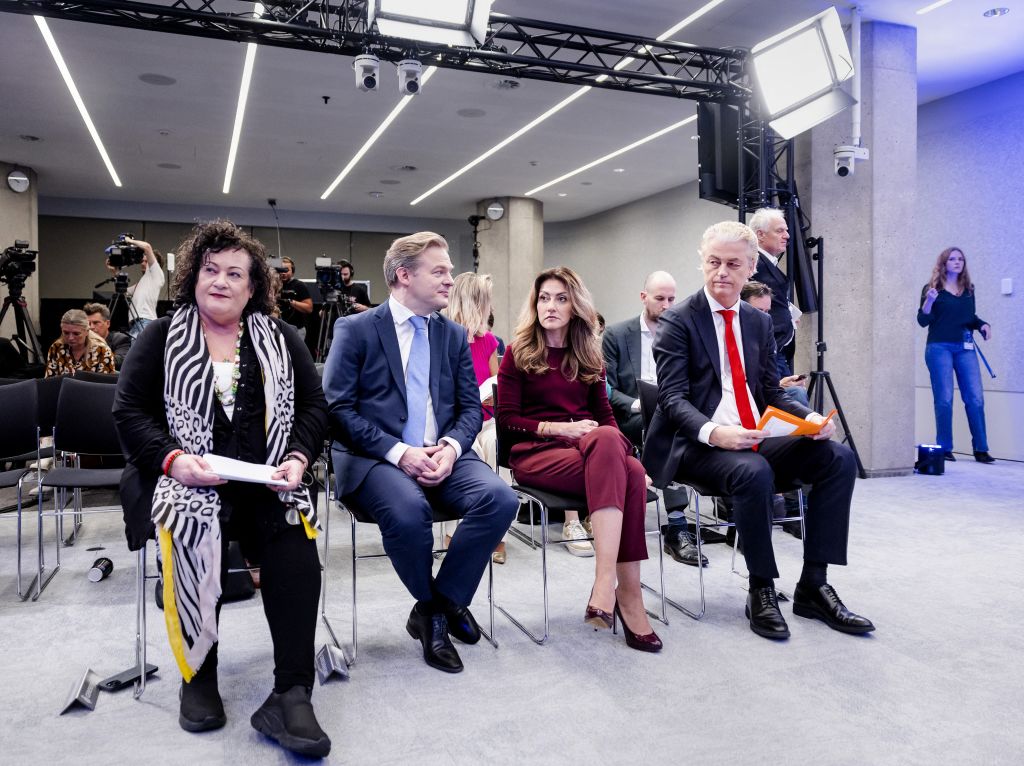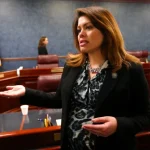
Dutch to get some of the toughest border control in the Western World as anti-Islamification populist Geert Wilders makes govt breakthrough.
The post Netherlands to Create ‘Strictest Migration System Ever’ as Populist Geert Wilders Forms Government appeared first on Breitbart.
The Netherlands will finally get the right wing government its people voted for, and some of the toughest border control in the Western World after veteran populist and Islam sceptic Geert Wilders got the agreement of coalition partners to form a cabinet.
Geert Wilders, who has lived under strict round-the-clock police protection since 2004 over threats to his life by Islamists hailed the success of months-long negotiations between four right wing parties in the Netherlands to form a new government. “The sun will shine again in the Netherlands… The Netherlands will be ours again” he said in celebration of the development. The documents were presented to the Dutch King on Thursday afternoon.
Wilders, a former Breitbart News guest columnist, led his party to become the largest in the Netherlands in an unprecedented shift at the national elections last November in a result that sent the establishment centre and left into a tailspin of despair, but fell short of enough seats to govern alone. He immediately entered negotiations with three other parties of the right but diverging views on the political facts of life saw talks break down several times, and concerns that attempts to form a government — and keep the left wing out — could fail.

Netherlands’ party leaders (from L) Caroline van der Plas (BBB), Pieter Omtzigt (NSC), Dilan Yesilgoz (VVD) and Geert Wilders (PVV) attend a press presentation of the main lines of the 26-page coalition cabinet agreement they reached earlier on May 16, 2024 in The Hague after six months of gruelling talks between four parties following the stunning PVV election victory. (Photo by Sem van der Wal / ANP / AFP) / Netherlands OUT (Photo by SEM VAN DER WAL/ANP/AFP via Getty Images)
Now a major 26-page provisional agreement titled “Hope, Courage, and Pride” has been agreed by all four parties, and the task of actually forming a government and picking the cabinet will begin. Here already is one of the major compromises made by Dutch political veteran Geert Wilders, for after so long in the wilderness and now commanding the largest party in the country, he has had to surrender the chance to become Prime Minister himself to keep the other coalition partners happy.
Remarkably, to get around this impasse and make the agreement fair to all four parties, none of them will send their own politicians into government. It appears the ministry positions and Prime Ministership will be held by ‘technocrats’ — non-politicians and typically academics and economists — who would implement the government programme as dictated by the four.
Wilders has promised major reform on immigration, a priority area for his party and for others in the coalition, and the 26-page provisional document makes clear the enormous scope of change to the migration system envisioned, with laundry list of planned changes bullet-pointed. Laying out the ground for a programme that could make any pro-border control conservative envious, the document states in its preamble:
… The Netherlands is one of the most densely populated countries in Europe with [rapid and persistent population growth caused by] migration, which puts pressure on housing, care, education and financial resources, and on social cohesion in our country… Concrete steps are being taken towards the strictest admission regime for asylum and the most comprehensive package to control migration ever. The entire asylum and migration system is being reformed…
With this “strictest regime ever” and the entire migration system being rebuilt from the ground up, the conditions for those migrants and asylum seekers which do actually qualify to stay will be considerably improved, the coalition partners say. To achieve this, the government will announce an ‘asylum crisis’, allowing the use of special powers for two years including suspending the processing of asylum applications, what they call an “asylum decision freeze”, and deporting migrants with no residence permits, by force if necessary.
🇳🇱 After 5 months a right-wing government has finally been formed! 🇳🇱
During the first press conference Wilders announced he’ll be introducing the “toughest immigration policy the nation has ever seen”.
His party, the PVV, will govern with 3 other centrist and moderately… pic.twitter.com/Dk3FhwZnVK
— Eva Vlaardingerbroek (@EvaVlaar) May 16, 2024
The Netherlands will deter new arrivals, the incoming government says, by having the “strictest admission rules in Europe”, by housing arrivals in the most “austere facilities possible”, and by immediately deporting migrants found trying to cross the border without permission or without papers back to the other side.
Administratively, the law would flip the present burden of proof required when deciding migration applications, so asylum seekers have to prove they have a right to be in the country, rather than the expectation being the state having to prove that they don’t. The appeals process will be truncated, and rules changed to deport “nuisance” makers, “criminal aliens”, and “undesirable” migrants more quickly. There will be “strict action against violence and nuisance” by asylum seekers who act against women, LGBT individuals, and Christians, they said.
Asylum seekers are just a small part of the puzzle, however, and in common with many other European states — like the United Kingdom — they are dwarfed by legal migration, permitted by lax rules introduced by globalist, open borders governments. This would be tackled with a crackdown on job-visa migration, increasing the requirements on employers to not recruit for low-quality work, and holding employees responsible for migrant workers learning Dutch to a high standard.
Similar moves are planned against misuse of education visas, and family or ‘chain’ migration to get overall arrivals down.
Dutch Election Sensation: Who are the Parties That Could Help Populist Geert Wilders Become Next Prime Minister? https://t.co/J4M985gp3z
— Breitbart London (@BreitbartLondon) November 29, 2023
Also featured in the border control portion of the document are policies to protect Dutch culture, beyond strengthening Dutch language requirements. Also in the sights of the incoming government are demands that foreigners who want Dutch citizenship having to renounce their previous citizenship, restrictions on “amplified prayer calls” — such as are issued from Mosques — and imported honour crimes like female genital mutilation and forced marriage.
While all four partners agree on tackling immigration to one degree or another, the influence of the other parties in the coalition is perhaps clearer in the rest of the document’s broad selection of policy areas. The second largest party in the coalition is the centre-right establishment-conservative VVD, the party of outgoing Prime Minister and chief globalist Mark Rutte. The party has already shown a willingness to move beyond the Rutte era and previous dismissal of the idea of working with Wilders in government.
Third largest party is the NSC, a narrow-focus centre-right party which campaigns on improving the quality of politics and governance in the Netherlands, as well as promoting sound money and reducing mass migration. Critical of neoliberalism and strongly anti-establishment, the NSC wants to see widespread political reform to make the Netherlands more democratic, open, and focused on a healthy society.
The junior partner of the coalition is perhaps the most remarkable, given it has gone from being founded to entering government in just one year. The farmer movement BBB was established in direct response to outgoing Prime Minister Mark Rutte’s aggressive implementation of European Union green directives, which threatened to send a wrecking ball through Dutch agriculture for the sake of environmental goals.
The government priorities apportioned to each are clear. To the BBB, the government document declares: “Our farmers, gardeners and fishermen must be cherished, because they are important for our food supply and the Dutch cultural landscape, and are an inseparable part of our Dutch culture”. Cancelling the anti-farm policies of the old government, the coalition announces “There will be no forced reduction of the livestock population and no forced expropriation“.
“Our government doesn’t cater to the wishes of its own citizens, it caters to globalist institutions whose interest it is to control the food supply, so they can control us.”
“It’s the great reset in full force,” said @EvaVlaarhttps://t.co/4qJNJ1oDKp
— Breitbart London (@BreitbartLondon) November 30, 2022
Other areas of green policy are moved against, including cancelling the controversial forthcoming ban on home boilers for heating, requiring new wind turbines to be built at sea rather than on land, and creating a new generation of nuclear power plants to ensure energy security and bountiful supply into the future.
The agreement promises to keep “the Dutch safe through a robust approach to crime and terror”, while noting “Our democratic constitutional state is threatened by Islamic terrorism and directly undermined by organized crime.” On politics, a major reform of the electoral system is mooted, which would take the Netherlands from a European-style party list system to an Anglo-type representative constituency model, where voters can select an individual to represent their area, not just a party label.
This concession to the NSC would see “the regional bond between voters and elected officials” strengthened and give “more say” to citizens, it was said.
Other important policy areas include increasing homebuilding to address shortages, reforming education including ensuring “teaching methods must be proven effective and politically neutral”, public safety, and the economy.
While it has been nearly six months of talks since the election — although this is not the longest post-election coalition negotiation in Dutch history by a considerable margin, yet — there is still some way to go. The cabinet has to be selected, and a Prime Minister, and as NSC leader Pieter Omtzigt states, this is likely to be another stumbling block. He said: “That is still crucial. If you want a government to succeed, you need a prime minister that unites”.
EU Backs Dutch Scheme to Forcibly Shut Down Thousands of Farms, Ban Farmers From Returning to Agriculture Foreverhttps://t.co/3SePLYsnXU
— Breitbart London (@BreitbartLondon) May 3, 2023
But the man to be de-facto leader, Geert Wilders, is optimistic. “We have a negotiating agreement, so that is very good news”, he said on Wednesday night before the four parties had signed off on the document agreed by their representatives in the negotiation room, and remarked: “I hope we will get there. I think we will get there. I cannot see it going wrong”.
While the coalition members are clearly pleased, the opposition parties are — obviously — unhappy and have roundly criticised the bid to form a government. As reported by Dutch broadcaster NOS, the centrist Christian Union accuse the document of being built on “shaky foundations, a lot of wishful thinking”, and criticises it for making the Netherlands less generous towards others. Frans Timmermans, the veteran Eurocrat who returned to Dutch politics for this election with every intention of becoming Prime Minister himself, was obviously also downbeat about the paper, calling it “disastrous”.
The Netherlands is one of the only countries in Europe so far with a dedicated political party for Muslims, Denk (‘Think’), who said it was a “dark day” to see the “extreme right” get closer to government. Strong words, perhaps, but not as strong as a Denk party press officer who was caught on camera on election night last year comparing the results to 9/11.
There are also early indications the incoming government will face the same problems encountered by the United Kingdom in its efforts to control its borders, namely asylum lawyers. The plans to tighten controls are contrary to existing Dutch law and the nation’s obligations to international treaties, they are reported to have warned, stating they are certain the policies “will not stand up in court”, says the Association of Asylum Lawyers and Lawyers in the Netherlands.
Such problems can, of course, be overcome — Australia long ago proved that with Operation Sovereign Borders. But it requires some fortitude and determination, as Britain’s government has discovered to its cost.
Exclusive—Inside @JMilei‘s election victory call to @RealDonaldTrump. https://t.co/GVjebB0cNM
— Breitbart News (@BreitbartNews) January 7, 2024
This story is developing, more follows.





